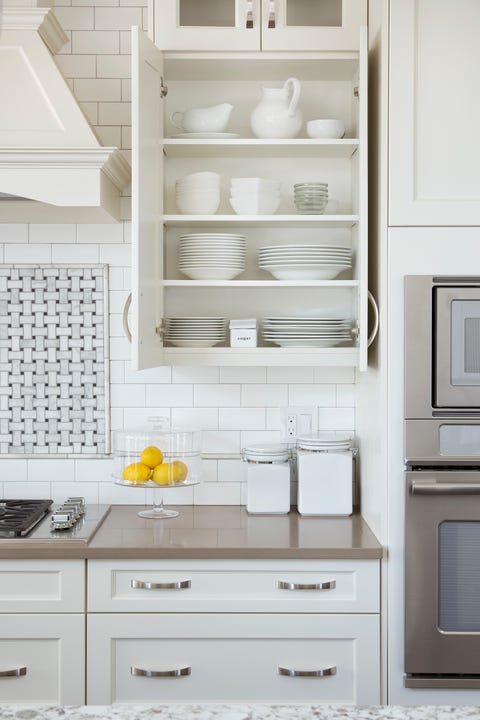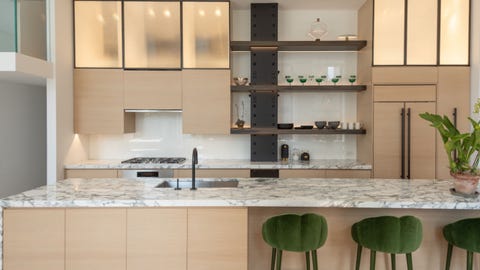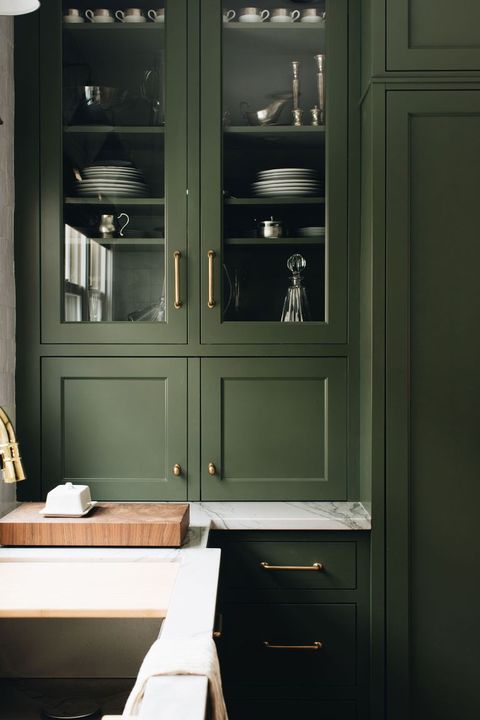
These days, our Pinterest and Instagram feeds seem to be saturated with that fashionable kitchen dust trap: open shelving. More and more, it seems, homeowners are doing away with upper cabinets in favor of painstakingly styled wall shelves. So, when I embarked on a marathon of interviews for House Beautiful's October Kitchens Issue, I knew there was one question I had to ask designers: Are upper cabinets over? Well, more than a dozen designers later, I can say with certainty that the answer is a resounding NO—but with some fine print.
"The thing about open shelving is it suits some people but they really have to get styled," explains Mally Skok. "They look like the Pinterest board person has just left the building, which is fine, but maintaining that and making it still always look cool—you know those piles of plates are going to be used and people will put them back in the wrong place."
Courtney McLeod of Right Meets Left Interior Design has similar reservations. "It looks so great in pictures," she says of open shelving,"but who wants another place to dust and clean in the kitchen? There's just so much pressure to have them look perfect all the time."

Glass-fronted upper cabinets in a kitchen by Amy Kalikow.
Says Amy Kalikow, "Realistically, a lot of most of my clients are families with kids, so they're not keeping them like that. Reality has to play a role in your design choice." Instead, she says, "wWe've been integrating textured glass, which makes it feel a little lighter. But it's still, you know, the mismatch."
Robin Baron agrees. "It's always important to be practical as well as thinking about making a design element beautiful and exciting," she says. "Upper cabinets are an important storage feature. That said, I love to think out of the box: Think about mixing open shelving with upper cabinets and using different materials for each. Use different glass textures in the cabinets and mix metal grating or mesh with glass to have a distinctive look in the upper cabinets."
Caroline Rafferty is also a fan of the mix: "I typically need as much closed storage as possible but it is nice to have some open shelves or glass-front doors to lighten up the cabinetry," she says.

Of all the designers, Jean Stoffer may have been the most anti-upper—though she doesn't outlaw them entirely. "We use upper cabinets very sparingly," she says. "We prefer windows. But we all need storage, so often we design full height cabinetry on a wall that handles most of the storage needs."
Stoffer has also taken to creating more storage in drawers instead of upper cabinets—a decision that makes it easier for clients who want to age in a place.
This attitude taps into what should be a major factor in your decision making: What storage option will accommodate YOU? As Nicole White says, "The most important thing is for a kitchen to make sense for the client." Most of the designers I talked to will count every single spice, cereal box, and plate in a client's kitchen to design appropriate storage for them.
"If you want to avoid uppers, ask yourself if you can really accommodate the necessary storage space elsewhere," urges Sean Leffers. "Maybe in a gorgeous old pine cupboard? In some kitchens, though, upper cabinets are absolutely the best solution so they will never go away entirely." So there you have it. Upper cabinets: still a safe bet, as long as they're the right ones for your needs.




No comments:
Post a Comment